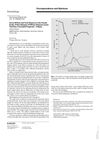Recent Advances in the Pathogenesis of Autoimmune Hair Loss Disease Alopecia Areata
January 2013
in “
Clinical and Developmental Immunology
”
TLDR Alopecia areata is caused by immune system attacks on hair follicles, often triggered by viral infections.
The document reviewed advances in understanding the pathogenesis of alopecia areata (AA), an autoimmune disease where cytotoxic T cells targeted hair follicles. It highlighted the role of hair follicle immune privilege, which, when disrupted, led to autoimmune attacks on hair follicles. Genetic factors were discussed, noting specific HLA alleles associated with AA, and 139 SNPs linked to the disease were identified. The role of interferon-gamma in immune privilege collapse, often triggered by viral infections, was explored. Additionally, AA was associated with other autoimmune diseases like thyroid disorders and vitiligo, and linked to psychiatric conditions such as anxiety and depression. The involvement of Th1/Tc1 cells and chemokines like CXCL10 was noted, with environmental factors such as viral infections potentially triggering immune privilege collapse. Stress hormones were also considered, suggesting emotional stress might exacerbate AA due to a blunted corticosterone response. These insights were expected to aid in developing new treatments for AA.










